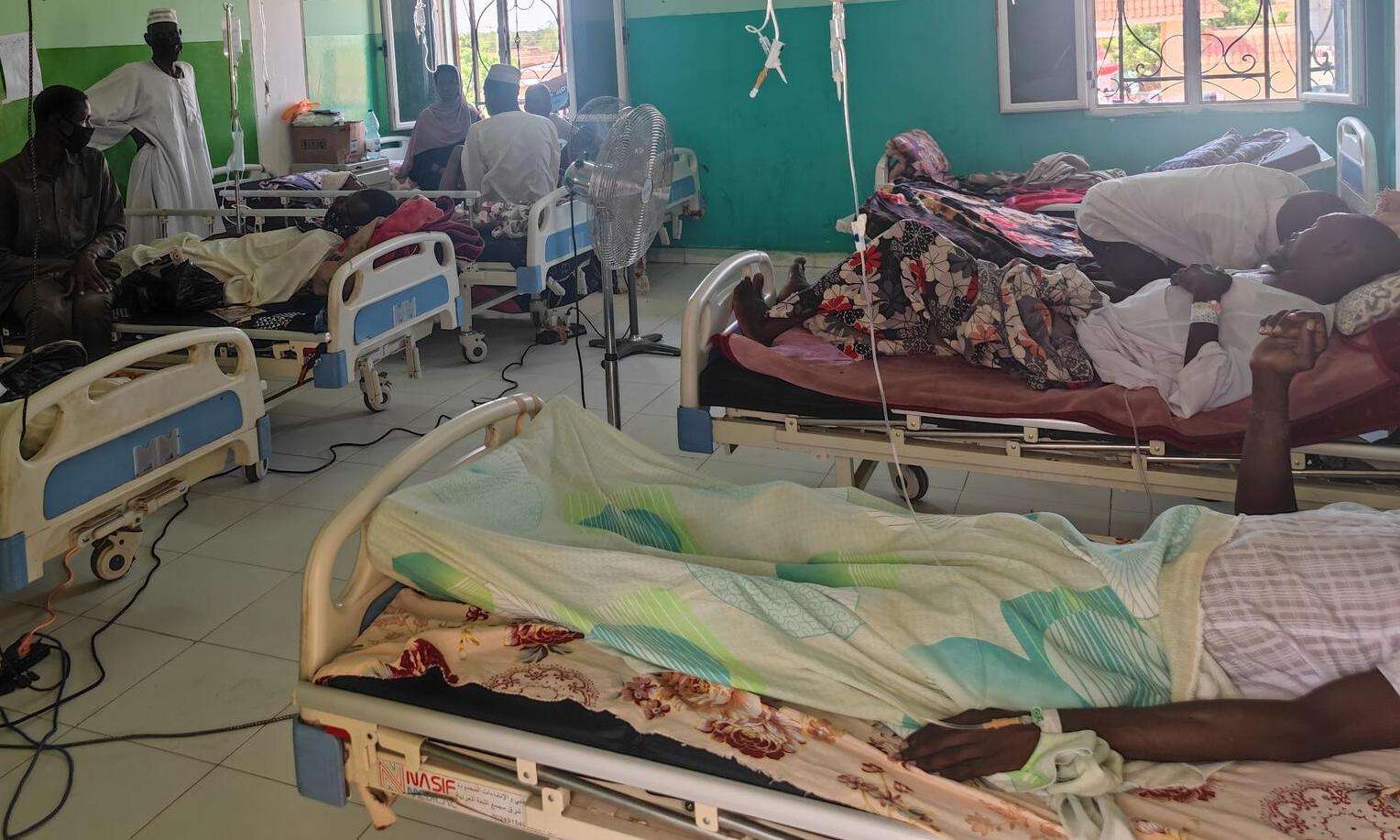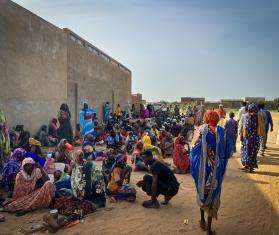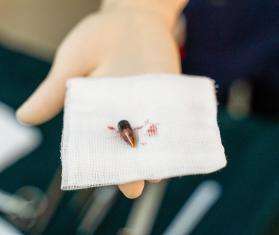In the three months since the sharp escalation of conflict in Sudan on April 15, Doctors Without Borders/Médecins Sans Frontières (MSF) and Ministry of Health staff have treated over 1,000 war-wounded patients at South Hospital in El Fasher, North Darfur state.
In this update, Mohammed Alfaqeeh, MSF’s project coordinator in El Fasher, describes how the intense fighting has impacted people’s lives. MSF teams here have managed to transform a small maternity facility with no surgical capacity into the main referral hospital for the whole of North Darfur state, which has a population of over 2.8 million people.
What is the current situation in El Fasher?
The situation in El Fasher, the capital of North Darfur, remains tense. Fighting has been ongoing since the beginning of the conflict on April 15, and there are a variety of military and armed groups operating in the area. Currently, the Sudanese Armed Forces (SAF) and the Governor of Darfur are in control of the city, where roadblocks have been placed at the entrances to each residential neighborhood, and where there are numerous sand barriers and checkpoints across the city. Despite assurances of a ceasefire, the city is still under attack and this ongoing violence has had a significant impact on people who live in El Fasher.
Due to the fighting and the risk of looting, the central market has been closed for weeks, with just a few stores sometimes opening their doors. Salaries have not been paid, and the lack of income from closed businesses and workplaces has severely affected people—particularly daily wage workers who live paycheck to paycheck.

Sudan: Violence and bureaucratic obstruction threaten medical aid
Read moreTransportation issues have prevented the arrival of many essential items. The roads connecting El Fasher to other localities, such as the towns of Kutum, Tawila, and El Obiud, are partially closed and there are multiple militia groups operating along these routes who rob passengers of their belongings. El Fasher depends on Khartoum [for supplies], or smuggling routes from Chad or Libya, leaving the city with limited options. And even though some vehicles have been able to transport goods from these neighboring countries, militias or looters end up with most of the items.
The scarcity of resources has led to skyrocketing prices, worsening difficulties people are facing. The closure of all banks, some of which have also been looted, has added to the economic strain. And although a few escorted convoys have managed to bring some food items from Port Sudan, shortages persist.
How has the fighting impacted people’s access to health care?
The Ministry of Health is struggling to meet the enormous demand for health care. Although it has received some donations from the World Health Organization (WHO), there is an overall lack of supplies, inadequate funding, and very limited support from international NGOs—many of which left the region when the conflict began. Only 10 to 15 health facilities are currently operational in El Fasher, as opposed to more than 100 before the current conflict began.
The lack of fuel, particularly diesel, recently halted the city's power and water supply for three weeks. The dire consequences included the deaths of 100 dialysis patients, who could no longer receive the treatment that was saving their lives. MSF has since received a request to provide fuel for this dialysis center, and we are now supplying 200 gallons per month.

Darfur fighting disrupts medical care and nutrition programs
Read moreIn June, North Darfur’s Ministry of Health received its first shipment of medical supplies from Port Sudan. This is the sole cargo that the state has received since the onset of the crisis. Many supplies were relocated to other regions within Darfur, such as El Geneina, and far more are needed.
Regrettably, last week, a Ministry of Health warehouse in the eastern part of El Fasher was looted, further adding to the shortages that people are facing. Although some private pharmacy stores continue to be partially operational, they too face challenges associated with general shortages of medicines. The dialysis center managed to secure medicines from this Port Sudan shipment, but sadly the supplies did not arrive in time to prevent the patients from passing away.
What is MSF doing to help?
MSF has been supporting South Hospital in El Fasher since February this year, and to-date, along with Ministry of Health staff, we have treated more than 1,000 war wounded patients. Before the conflict began, however, the hospital had no surgical capacity and we were working to transform it from a small facility that dealt with internal medicine, into a maternity hospital that could carry out emergency obstetric operations. We delivered our first baby in February but were still referring emergency cases requiring C-sections to the nearby Saudi Hospital because our operating theater was not yet up and running.
However, when the conflict began and all other hospitals in the city were forced to close, surgeons from these other hospitals came voluntarily to operate on the war wounded at South Hospital and we have since worked with the Minitry of Health to repurpose the facility into one that is capable of responding to mass casualty events—and of performing emergency surgical operations.

Lack of water, power, and fuel impact lifesaving care in Sudan
Read moreAt present, MSF is responsible for maternity and surgical services within the hospital. We have recruited 140 members of staff and have carried out modifications to the hospital layout to enhance patient care. As a result, South Hospital now has two operating theaters, and provides medical services for the war wounded, those with chronic diseases, internal medicine issues, and outpatient consultations, including laboratory and X-ray services.
We have also replaced the hospital's generator and upgraded its internal electrical connections, ensuring a consistent power supply throughout the facility. In addition, we have rehabilitated the water and sanitation infrastructure and taken over responsibility for water treatment and water distribution.
What is happening at South Hospital right now?
South Hospital is now the only referral hospital for North Darfur state. Other facilities were forced to close when the conflict began—the pediatric hospital, for example, was looted, while others are only partially functioning due to lack of medicines. As a result, South Hospital is overwhelmed and is struggling with overcrowding. It only had 36 beds when the conflict began, and although it now has over 110 beds, all the wards are full, and patients are still being treated in the corridors because there is not enough space.
At present, we are receiving around 10 war-wounded patients per day, we’re doing four to five surgeries a day, and approximately 50 dressing changes are required each day as well. Most of the cases we are treating now come from the eastern parts of El Fasher, as well as the towns of Kutum and Tawila.
Tawila town and Tawila IDP camp were recently attacked, resulting in numerous casualties and the displacement of approximately 18,000 to 19,000 households. About a quarter of these households have arrived in El Fasher, along with a number of people who have managed to get here from Kutum. Many people have reached us in a critical condition and some reported that due to the current security situation, it took them a week to reach the hospital.
Some displaced people have sought shelter in 40 schools across the city, but around 600 who fled eastern El Fasher, Kutum, and Tawila sought safety in the grounds of the hospital. Despite several attempts to relocate them, these initiatives were unsuccessful for quite some time. We have now managed to relocate around 500 people, but there are still around 100 living within the hospital grounds.
Additionally, with over 500 people present in all the hospital departments throughout the day—including caregivers, visitors and volunteers—crowd control at South Hospital is a serious concern.

Sudan crisis response
Read how MSF is helpingWe delivered 10 tons of surgical supplies to the hospital in mid-May 2023 from Chad, significantly contributing to the hospital's ability to provide life-saving treatment. However, due to multiple constraints, it took us six weeks to get this first shipment into the country, and negotiating access remains a huge challenge.
Is the situation going to improve at the hospital?
MSF is striving to maintain a regular supply of medicines, fuel, and water, to facilitate the smooth running of the hospital, and we aim to save more lives by continuing to enhance the quality of medical care provided. While the situation is manageable at the moment, we sincerely hope that the catastrophic events that unfolded at the beginning of the conflict are not repeated.
In the first 48 hours of the fighting, 136 wounded people arrived at South Hospital and 11 people died from their injuries. By the fifth day, we had received 279 wounded people and 44 had died from their injuries. Now, the death toll in El Fasher stands at over 300 and we have treated over 1,000 people with war injuries. In the hospital, 60 percent of beds are currently occupied by war-wounded patients—many of whom are coming to terms with life-changing injuries.
With the arrival of the rainy season and, along with it, diseases like malaria and cholera, we expect pressure on the hospital to increase significantly over the coming weeks—even without a deterioration in the security context. But if the fighting intensifies and we receive a new influx of wounded people, the situation will again become catastrophic. The team is now trained in how to respond to mass casualty events, and we are ready, but the reality of the situation is that we, and everyone in the city, are hoping for the best at the same time as truly preparing for the worst.




